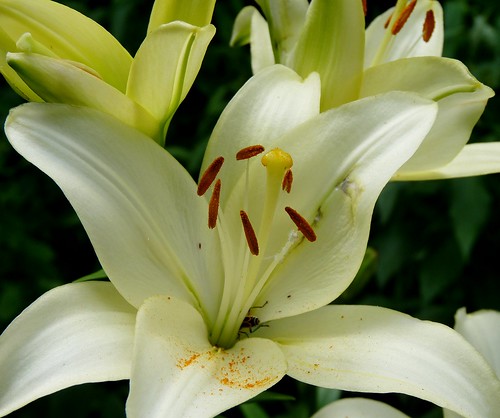
I was once at the grave of Rabbi Shim'on bar Yohai, not on Lag Ba'Omer, and experienced there the most peculiar behavior that I have ever witnessed in the context of tefillah / Jewish prayer. It was an otherwise ordinary afternoon, and there was a standard pick-up minhah (brief afternoon service) going on nearby, attended by a handful of guys who seemed to be from the same Haredi sect.
They arrived at the end, and one of them began saying the Mourner's Kaddish, the prayer recited by those who have recently suffered a loss or are recalling the annual observance of a relative's passing. They came to the congregational response, usually similarly intoned in a spoken-word form - no music, marking the mourner's sadness. And then something truly wacky happened: all of the assembled began to SHOUT WITH ALL THEIR MIGHT, "Amen! Yehei shemei rabba mevarakh le'alam ul'alemei alemaya!" "May God's great name be praised throughout all time!"
I think I jumped. I had never heard anything like that.
A few years later, as I was studying liturgy seriously at the Jewish Theological Seminary, I encountered a real gem of Talmudic wisdom, and experienced a brief moment of revelation (Bavli Shabbat 119b):
In other words, if you scream this line when responding to a mourner, you get a whole lot of Heavenly credit, and a guaranteed place in the world to come. I realized, in retrospect, that this is exactly what was going on during that otherwise ordinary minhah: they were taking this piece of wisdom literally.אמר רבי יהושע בן לוי: כל העונה אמן יהא שמיה רבא מברך בכל כחו ־ קורעין לו גזר דינוRabbi Yehoshua ben Levi taught: One who says, "Amen! Yehei shemei rabba mevarakh..." with all his strength, any [negative Divine] decree against him is torn up.
I do not necessarily recommend shouting in synagogue. Depending on the congregation, the reactions by others might vary from discomfort to shock to bodily removing you from the building. But we might want to think, not only as we respond to those in mourning but throughout our tefillah, about Rabbi Shim'on bar Yohai, about the bonfires of the soul, and about pouring all our might into forming those words of prayer.
~
Rabbi Seth Adelson
* "Lag", ל''ג, is not a word but a number: the Hebrew letter lamed has a numerical value of 30 and the gimmel a value of 3.
.jpg)



